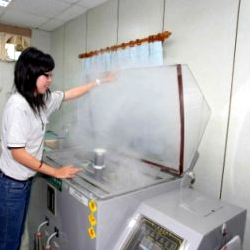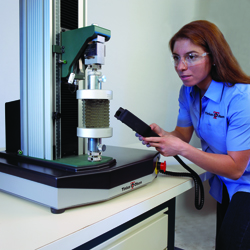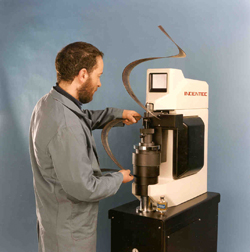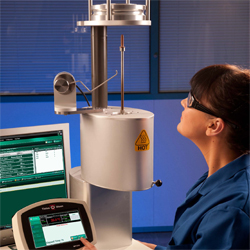Testing Laboratory
We have provided many kinds of testing service for many types of materials by quality testers, Tinius Olsen (UK) Universal Testing Machine 5 kN (500 Kgf), Indentec (UK) Rockwell Hardness Tester, Suga-Test (Japan) Salt Spray Tester and Tinius Olsen (USA) Melt Flow Indexer. The Testing Certificate and Report are provided to certify testing results.
Salt Spray Test

The salt spray test is a standardized and popular corrosion test method, used to check corrosion resistance of materials and surface coatings. Usually, the materials to be tested are metallic and finished with a surface coating which is intended to provide a degree of corrosion protection to the underlying metal.
Test standards:
- ASTM B117 Standard Practice for Operating Salt Spray (Fog) Apparatus
- JIS Z2371 Methods of Neutral Salt Spray Testing
- ISO 3768 Methods of Neutral Salt Spray Testing (NSS Test)
- ISO 9227 Corrosion Tests in Artificial Atmospheres - Salt Spray Tests
Tension and Compression Test

The Universal Testing Machine are designed to test a wide range of materials, including, but not limited to: plastics, films, paper, packaging materials, filter material, adhesives, foils, food, toys, medical devices and components, in tension, compression, flexure, shear, and peel. There are many of test standards used this machine to be apparatus.
Test standards:
- ASTM D882 Standard Test Method for Tensile Properties of Thin Plastic Sheeting
- ASTM F88 Standard Test Method for Seal Strength of Flexible Barrier Materials
- ASTM D897 Standard Test Method for Tensile Properties of Adhesive Bonds
- ASTM D1894 Standard Test Method for Static and Kinetic Coefficients of Friction of Plastic Film and Sheeting
- ASTM D790 Standard Test Methods for Flexural Properties of Unreinforced and Reinforced Plastics and Electrical Insulating Materials
- BS EN 1465 Determination of tensile lap-shear strength of bonded assemblies
- ASTM D642 Standard Test Method for Determining Compressive Resistance of Shipping Containers, Components, and Unit Loads
- and more...
Rockwell Hardness Test

Rockwell Hardness Test is the most commonly used for hardness test of metal structure or surface conditions. It is determined by measuring the permanent depth of the indentation produced by a force/load on an indenter. A variety of indenters may be used: conical diamond with a round tip for harder metals to ball indenters ranges with a diameter ranging from 1/16” to 1/2” for softer materials.
Test standards:
- ASTM E18 Standard Test Methods for Rockwell Hardness of Metallic Materials
- ISO 6508 Metallic materials - Rockwell Hardness Test
Plastic Melt Flow Rate

Melt Flow Indexer has long been used to determine the melt-flow rate or mass-flow rate (MFR) of virgin and compounded thermoplastic resins. With the increased pressure on plastics processors to comply with quality standards for quality management, more of them are testing to evaluate incoming material and test finished products.
Test standards:
- ASTM D1238 Standard Test Method for Melt Flow Rates of Thermoplastics by Extrusion Plastometer
- ISO 1133 Standard Test Method for Melt Flow Rates of Thermoplastics by Extrusion Plastometer